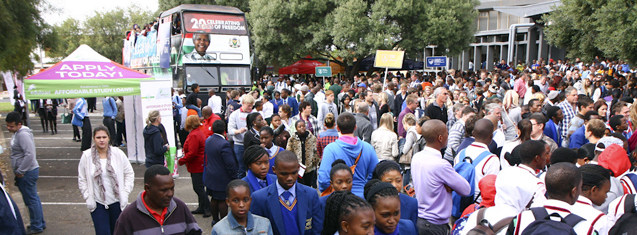Latest News Archive
Please select Category, Year, and then Month to display items
02 January 2025
|
Story Gerda-Marie van Rooyen
|
Photo Supplied
 Leading the research in South Africa is Prof Linus Franke from the Department of Soil, Crop and Climate Sciences.
Leading the research in South Africa is Prof Linus Franke from the Department of Soil, Crop and Climate Sciences.
Scientists are actively pursuing the successful breeding of diploid hybrid potatoes from inbred lines. This is expected to revolutionise potato breeding as it holds the key to rapid genetic progress. It will introduce new varieties for commercialisation through seed. Currently, existing potato variants have a gene that renders self-pollinated seeds infertile.
Prof Linus Franke, an academic in the Department of Soil, Crop and Climate Sciences at the UFS, is leading the research in South Africa. “This technology allows the production of genetically uniform potato seed that is easy to transport and largely disease-free.” He says this differs from conventional breeding whereby only vegetative propagation is possible due to tetraploid varieties in potatoes. It also risks carrying pests and diseases from one generation to the next – leading to the accumulation of pests and diseases with each round of multiplication.
Seed innovation
Prof Franke explains that Solynta BV, a seed company based in the Netherlands that produces potato varieties that can be grown from seed, has included South Africa in their research efforts because it is one of Africa’s largest producers and exporters. Through his academic relationship with Wageningen University and Research, a Dutch institution renowned for its agricultural endeavours and food production, the UFS became involved in researching hybrid potatoes grown from seed.
Diploid seeds containing two sets of chromosomes allow easier gene manipulation to increase predictability and speedier genetic progress. The breeding approach enables the incorporation of tolerance to pests, diseases, abiotic stresses (cold, heat, drought) and other desired genetic traits.
Although Prof Franke is optimistic about this research, he is not blind to disadvantages. “Potato seeds are tiny and have little energy reserves, making it harder to grow potatoes from seed than from tubers.” He says potatoes from seed will take longer to cultivate than tubers, as farmers need to grow plantlets from seeds first, adding six weeks to the growing period. “It is possible that commercial farmers can grow potatoes directly from seed. Alternatively, perhaps more likely, specialised growers will produce tubers of potatoes from seed; these tubers are then sold as seed tubers to other potato farmers, who then continue their normal practices of producing potatoes for the market from tubers.”
Financial benefits
Prof Franke says farmers have reason to get excited. “Seed potatoes will reduce input costs, as varieties with enhanced tolerance to pests and diseases require less pesticides. Planting one hectare of potatoes requires three to four tonnes of potato tubers, but only one 25 g packet of potato seeds.” Since potatoes are a more valuable commodity than maize, this technology might also increase farmers’ income potential.
Now prospective Kovsies also know the feeling
2014-05-12

The UFS was a hive of excitement and activity with the annual Kovsie Open Day on Saturday 10 May 2014.
From drumming up a storm during the welcoming ceremony to moving about the lively students and vibrant residence stalls, prospective students and parents can now also say that ‘only a Kovsie knows the feeling’. Visitors also had first-hand experience of how accessible our Vice-Chancellor and Rector, Prof Jonathan Jansen, really is. At the Talk to Me gazebo outside his office, Prof Jansen dished up food while having a chat with parents.
This gesture echoed what Prof Jansen said earlier the morning as he addressed visitors to our Bloemfontein Campus in the Callie Human Centre. “The difference between us as Kovsies and other universities is that we are interested in you as a human being,” he said.
He then went on to introduce some of Kovsies’ top achievers. Among others were Izelle Lategan (U/21 SA women’s hockey player of 2013), Wayde van Niekerk (SA and Varsity Athletics 400m champion) and Izelke Klindt (BSc Hons in Astro Physics and winner of the Dean’s Medal in the Faculty of Natural and Agricultural Sciences for 2014).
OFM presenter Success Lekabe, who acted as programme leader during the welcoming ceremony, praised the UFS as one of “the best university institutions from across South Africa.”
“Kovsies are changing their students’ lives to change the lives of others,” Lekabe said.
The 2014 Kovsie Open Day, with all its fun and laughter, reflected the truth of the UFS as an academic institution that inspires excellence and transforms lives to all its visitors.
Even if you missed the Kovsie Open Day, be sure to grab the chance to study at our university and ensure a lifetime of excellence and innovation.